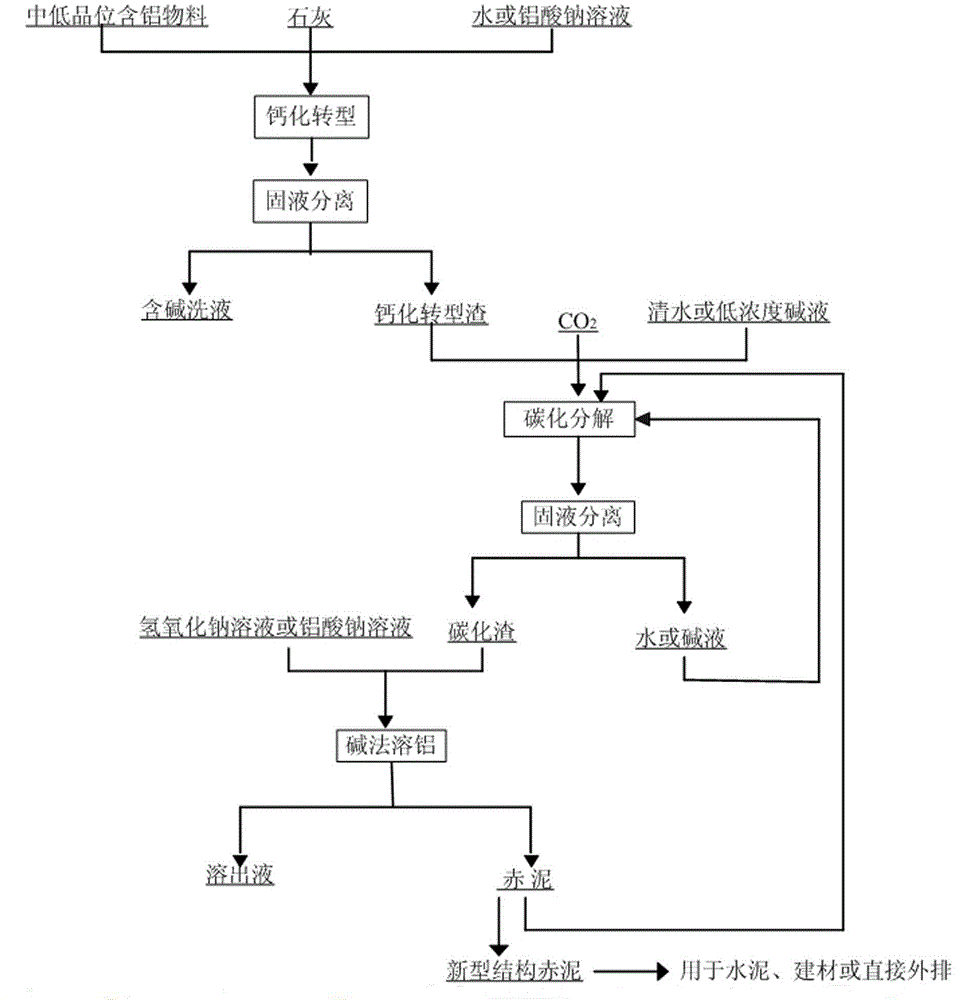A method for reducing the aluminum-silicon ratio of red mud by multi-stage carbonization
A technology of aluminum-silicon ratio and red mud, which is applied in the direction of alumina/hydroxide, etc., can solve the problems of low alumina recovery rate, increased alkali consumption, and large amount of high-alkali red mud stockpiling, so as to achieve low production energy consumption , Low alkali content, and the effect of solving the pollution of the red mud land occupation
- Summary
- Abstract
- Description
- Claims
- Application Information
AI Technical Summary
Problems solved by technology
Method used
Image
Examples
Embodiment 1
[0047] (1) First, mix lime and low-grade bauxite in a mass ratio of 0.25:1, and place them in a sodium aluminate solution with a caustic concentration of 260g / L and a molar ratio of sodium oxide to aluminum oxide of 2.5 at 260°C Stirring and reacting for 15 minutes, a calcified transition slag with hydrated calcium aluminosilicate as the main phase was obtained, and the liquid-solid ratio of the sodium aluminate solution to the solid material was 10mL: 1g;
[0048] (2) Mix the calcified transformation slag and clear water in a closed container, and pass CO into the closed container 2 , CO 2 The gas partial pressure is 0.1MPa, and the reaction is stirred at 160°C for 240 minutes to obtain carbide slag containing calcium carbonate, hydrated calcium silicate, aluminum hydroxide and incompletely reacted hydrated calcium aluminosilicate, and a liquid-solid mixture of clean water and calcified transformation slag The ratio is 15mL: 1g;
[0049] (3) Mix the sodium hydroxide solutio...
Embodiment 2
[0052] (1) Firstly, mix lime with medium and low-grade bauxite according to the mass ratio of 0.35:1, and at 200°C in a sodium aluminate solution with a caustic concentration of 140g / L and a molar ratio of sodium oxide to aluminum oxide of 3.5 Stirring and reacting for 60 minutes, a calcified transition slag with hydrated calcium aluminosilicate as the main phase was obtained, and the liquid-solid ratio of the sodium aluminate solution to the solid material was 3mL: 1g;
[0053] (2) Mix the calcified transformation slag and clear water in a closed container, and pass CO into the closed container 2 , CO 2 The gas partial pressure is 1.6MPa, stirred and reacted at 60°C for 30 minutes, and the carbide slag containing calcium carbonate, hydrated calcium silicate, aluminum hydroxide and incompletely reacted hydrated calcium aluminosilicate is obtained, and the liquid-solid mixture of clear water and calcified transformation slag is obtained. The ratio is 3mL: 1g;
[0054] (3) Mix...
Embodiment 3
[0057] (1) First, mix lime and low-grade bauxite in a mass ratio of 0.8:1, and place them in a sodium aluminate solution with a caustic alkali concentration of 180g / L and a molar ratio of sodium oxide to aluminum oxide of 3.0 at 100°C Stirring and reacting for 40 minutes, a calcified transition slag with hydrated calcium aluminosilicate as the main phase was obtained, and the liquid-solid ratio of the sodium aluminate solution to the solid material was 5mL: 1g;
[0058] (2) Mix the calcified transformation slag and clear water in a closed container, and pass CO into the closed container 2 , CO 2 The gas partial pressure is 1.2MPa, and the reaction is stirred at 110°C for 120 minutes to obtain carbide slag containing calcium carbonate, hydrated calcium silicate, aluminum hydroxide and incompletely reacted hydrated calcium aluminosilicate, and a liquid-solid mixture of clean water and calcified transformation slag The ratio is 7mL: 1g;
[0059] (3) Mix the sodium hydroxide sol...
PUM
 Login to View More
Login to View More Abstract
Description
Claims
Application Information
 Login to View More
Login to View More - R&D
- Intellectual Property
- Life Sciences
- Materials
- Tech Scout
- Unparalleled Data Quality
- Higher Quality Content
- 60% Fewer Hallucinations
Browse by: Latest US Patents, China's latest patents, Technical Efficacy Thesaurus, Application Domain, Technology Topic, Popular Technical Reports.
© 2025 PatSnap. All rights reserved.Legal|Privacy policy|Modern Slavery Act Transparency Statement|Sitemap|About US| Contact US: help@patsnap.com

